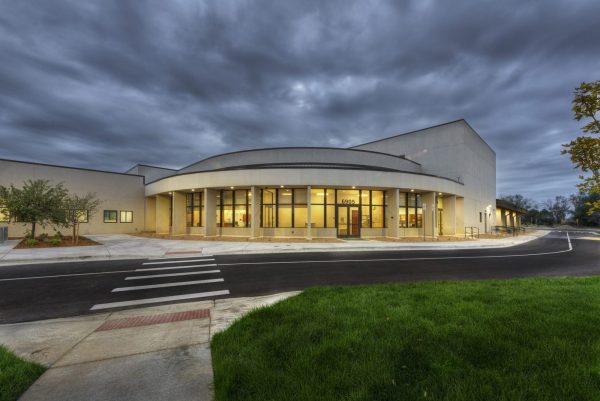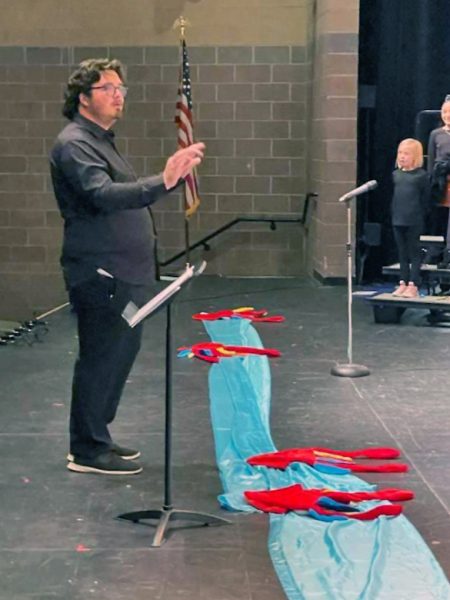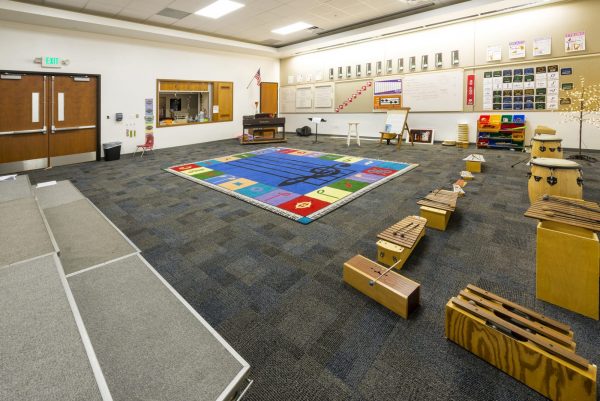We recently connected with Paul Beyer, who graduated from CSU with a Bachelor of Music in Music Education in 2023. Paul reflected on his first year teaching elementary and middle school music in Colorado.
Tell us a little about your job–where you teach, the types of ensembles you teach, and grade levels.
I work at West Ridge Academy K-8 Charter School in Greeley, Colorado. My course load includes 5-8 band, 6-8 choir, and 4th-grade recorder.

How was the job interview process, and what are some things you may have done differently?
Most mid-year jobs did not open on great terms, and there aren't many to find. I would've over-communicated to make sure we were all on the same page. My first interview went well, and I got the impression that the committee wanted me. I'd indicated in the application that I couldn't start until later due to student teaching; however, this detail surprised the principal as they needed the position filled immediately. While it was a good interview experience, there wasn't a path forward with me as a candidate. In a perfect world, they would have read every word of my application before inviting me in, but that is often not the case. Don't assume that your application has been read.
What is your general overview of your first year of teaching?
We are going through a lot of growth. Students are far below grade level proficiency, and most classes were difficult to control when I started. I have been affirmed by my admin because "taking a job at semester is one of the hardest things you can do in education," and while I have no frame of reference, I am inclined to agree. The transition from my predecessor was quite hard for many students, some parents, and even some teachers. Teachers got on board when the sounds from the music room improved, but students still struggle to understand music as an academic subject that requires a lot of work. Changing culture takes time.

How do you think working at a charter school might differ from a public school?
The differences between public charters and 'regular' public schools are less significant than people think. One that is accurate is that parents tend to be very involved with the functionality of the school, as opposed to a body of educators. That said, the relationship between the administration and parents has allowed teachers a great deal of freedom. The one that surprised me is that as a charter, we have less funding than other schools in the area rather than more. Public charters are not nearly as 'rich' as people think, and much of my student population is low SES.
What have been some of your biggest challenges this year and biggest successes?
My biggest challenge has been getting everybody, students and adults alike, to understand music as an academic subject. Students have been historically underserved on the middle school side of music, and it has caused a culture in which many students believe music is worthless. I've found success with my 4th and 5th graders because they haven't had a bad middle school music experience. The 4th and 5th graders have had immense musical growth in both technique and enjoyment, and I am particularly happy with the way I am scaffolding my recorder class to prepare them for 5th-8th grade concepts.
How is it navigating the many age ranges that you are teaching? Do you enjoy having these varying ages?
I hit the jackpot with my age range. The 4th graders still have general music with the other music teacher, in addition to my recorder class. This means I can prep ensemble skills before they get to band or choir without losing out on their general music experience. When they get to 5th grade, they don't have to learn the musical language and the instrument at the same time and can focus on learning the instrument. Currently, my 4th and 5th graders are at a higher level of proficiency than most of my middle schoolers, and because I have them for so long, I get to plan every step of my own vertical alignment. I also get to know almost the entire school.
What is an important lesson you learned this year?
Calm down. Take a minute. Only some issues need to be addressed right away. Sometimes, progress is slower than you expect, even if you already expect it to be slow, AND THAT'S OKAY as long as you have a plan to move forward.
Has anything overwhelmed you?
Grading. Students are not used to weekly homework assignments (I usually assign 30 seconds to two minutes worth of music for them to record as a practice log on specific excerpts), so many of them get turned in late. Under our grading system, I cannot count off if work is late, so kids can choose not to do the homework for months and then turn it all in at once. With the change in expectation and students still adjusting, many assignments get turned in late, and then all need to be graded at once. Students are getting used to it, and I can tell they are getting better because of it, but right now, it's hard.

What are your goals for the year ahead and in five years?
I want to be the person who gets the students excited about music again. That is my number one priority next year. In five years, I want to have been successful enough in fundraising and making connections to fill the school's inventory and secure a concert venue that is not a gym.
Has your philosophy of teaching changed at all since graduating?
If anything, I just feel stronger about the things I already did. My philosophy is based on financial accessibility, particularly in instrumental education. Both of my student teaching placements were in high SES populations with easy access to special needs services and interventionists. I am in a low SES population with almost no resources in either of those areas, and it has highlighted the need to create as many access points as possible.
How did your experience at CSU prepare you for this year of teaching?
CSU gave me many teaching opportunities before getting my contract. In addition to practicums all four years (including COVID), I was very active with the Middle School Outreach Ensembles, which was the closest to a realistic situation that you can get before student teaching. The focus on 'realisticness' throughout the program was a huge contributor to my success this year.
